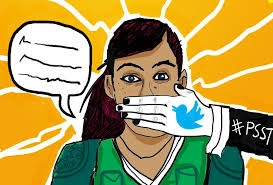
Hate's new shelter is the ‘difference of opinion’. The opinion may be political, religious, economic, social or even personal; rest assured, once it is expressed you will be hated for it. That is the one thing we can guarantee. We cannot guarantee empathy, sacrifice, support or even something as simple as a constructive debate over our opinions. We cannot guarantee that an adversity like a pandemic will bring us together as a nation and make us forget our petty differences, prejudices or our bitterness towards one another. But what can be guaranteed is hate.
It is difficult to say if hate with this intensity and frequency existed in pre-social-media times, but in my opinion, it didn’t. The convenience of spewing filthy and prejudiced mind out via a keyboard, from the comfort of one’s home and often behind-the-screen anonymity, has unleashed the worst in us. From political leaders to religious scholars, from artists to journalists, and from public figures to anyone who chooses to say anything at all, everyone is hated by someone. To be loved, you need to be fortunate and blessed enough. To be hated, all you need is to be alive and have an opinion –– any opinion.
It’s not just the anonymous trolls on social media who are venomous. There are ex-wives who have nothing to do except trolling their ex-husbands as an attempt to may be, suppressing the internal bitterness of regret. Similarly, there are those guys who’ll have a crush on a woman and send her a barrage of direct messages only to extend abuse and hate when those DMs are ignored or their advances are turned down. Then, there are government and opposition party spokespersons who believe spewing filth for their political rivals will help them win favors with their leaders; and the sad bit is that it does. There are writers, columnists, intellectuals, the blue ticks and each – or most at least – have this immense hate in their hearts for the prime minister, military, a religious figure, or a judge.
Why such online venom?
What has made us so bitter that we can’t just let go of any opportunity to abuse or demean others for their opinions because they do not conform to our own? Regardless of the context of discussion and how it began, where are our responses beginning with “I beg to differ” or “I see what you mean, but…”? Why have they been replaced with “Shut up”, “Oyay Libtard”, “O Youthiyay”, “Oyay Slut”, “Traitor”, “Boot palishiay” etc.
 It is fine to differ, let us agree to disagree, but words matter.
It is fine to differ, let us agree to disagree, but words matter.
For instance, we might disagree with a woman’s understanding of, and demand for, her rights and freedoms. However, we are absolutely out of line to judge her without having an iota of a clue of what she has been through personally or what injustice she has observed happening to women around her. It is even more ridiculous to call her names for saying what she says.
Political differences are the beauty of democracy, one of its most significant elements in fact. But deriding a political party’s leader for the way he/she walks or talks or holds a string of beads is plain immature. These are not political differences but expressions of hate disguised as criticism.
 A healthy and constructive discourse is what helps people evolve, to be productive and insightful. Social media alone is not to be blamed for our growing hate and sheer inability to have respectful disagreements, healthy discussions and productive debates. These forums have only given an outlet to our intolerance, virulence and bitterness.
A healthy and constructive discourse is what helps people evolve, to be productive and insightful. Social media alone is not to be blamed for our growing hate and sheer inability to have respectful disagreements, healthy discussions and productive debates. These forums have only given an outlet to our intolerance, virulence and bitterness.
Adversities bring people together, or at least they used to. At a time when the entire world is facing a common enemy, we seem to be incapable of shunning our differences. This is taking us deeper into the dark depths of collective ignorance. We have already sunk deep enough. It is time to turn around.
It is difficult to say if hate with this intensity and frequency existed in pre-social-media times, but in my opinion, it didn’t. The convenience of spewing filthy and prejudiced mind out via a keyboard, from the comfort of one’s home and often behind-the-screen anonymity, has unleashed the worst in us. From political leaders to religious scholars, from artists to journalists, and from public figures to anyone who chooses to say anything at all, everyone is hated by someone. To be loved, you need to be fortunate and blessed enough. To be hated, all you need is to be alive and have an opinion –– any opinion.
It’s not just the anonymous trolls on social media who are venomous. There are ex-wives who have nothing to do except trolling their ex-husbands as an attempt to may be, suppressing the internal bitterness of regret. Similarly, there are those guys who’ll have a crush on a woman and send her a barrage of direct messages only to extend abuse and hate when those DMs are ignored or their advances are turned down. Then, there are government and opposition party spokespersons who believe spewing filth for their political rivals will help them win favors with their leaders; and the sad bit is that it does. There are writers, columnists, intellectuals, the blue ticks and each – or most at least – have this immense hate in their hearts for the prime minister, military, a religious figure, or a judge.
Why such online venom?
What has made us so bitter that we can’t just let go of any opportunity to abuse or demean others for their opinions because they do not conform to our own? Regardless of the context of discussion and how it began, where are our responses beginning with “I beg to differ” or “I see what you mean, but…”? Why have they been replaced with “Shut up”, “Oyay Libtard”, “O Youthiyay”, “Oyay Slut”, “Traitor”, “Boot palishiay” etc.
 It is fine to differ, let us agree to disagree, but words matter.
It is fine to differ, let us agree to disagree, but words matter.For instance, we might disagree with a woman’s understanding of, and demand for, her rights and freedoms. However, we are absolutely out of line to judge her without having an iota of a clue of what she has been through personally or what injustice she has observed happening to women around her. It is even more ridiculous to call her names for saying what she says.
Political differences are the beauty of democracy, one of its most significant elements in fact. But deriding a political party’s leader for the way he/she walks or talks or holds a string of beads is plain immature. These are not political differences but expressions of hate disguised as criticism.
 A healthy and constructive discourse is what helps people evolve, to be productive and insightful. Social media alone is not to be blamed for our growing hate and sheer inability to have respectful disagreements, healthy discussions and productive debates. These forums have only given an outlet to our intolerance, virulence and bitterness.
A healthy and constructive discourse is what helps people evolve, to be productive and insightful. Social media alone is not to be blamed for our growing hate and sheer inability to have respectful disagreements, healthy discussions and productive debates. These forums have only given an outlet to our intolerance, virulence and bitterness.Adversities bring people together, or at least they used to. At a time when the entire world is facing a common enemy, we seem to be incapable of shunning our differences. This is taking us deeper into the dark depths of collective ignorance. We have already sunk deep enough. It is time to turn around.
